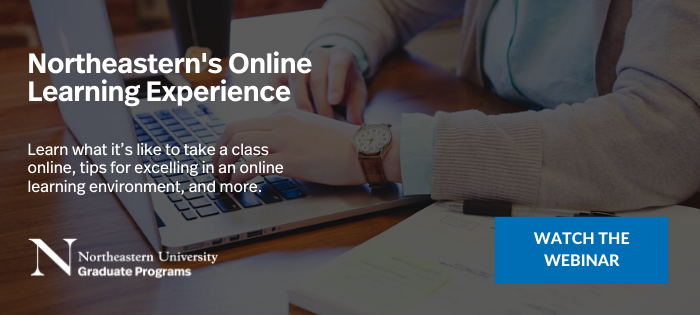
Online education is growing in popularity, with a third of all students now enrolled in at least one online course. Given the many benefits of online learning—including flexibility and affordability—it’s easy to understand why distance learning is so attractive to prospective students.
While online learners reap many of the same benefits as their on-campus counterparts, when it comes to networking, some students fear that making meaningful connections will be more difficult, if not impossible, in a virtual setting—after all, it’s hard to hand out business cards through a computer screen!
Students are right to be concerned since networking is such a key component of career success. In fact, some studies suggest 85 percent of job placements occur as a result of professional connections. Fortunately, networking is entirely possible for online learners. Even without the face-to-face interactions that occur in traditional classroom settings, distance learners can grow their professional network by embracing a different approach.
The Importance of Networking in Grad School
For both online and on-ground students alike, networking is an important aspect of graduate school. During your studies, you will be surrounded by classmates, professors, and alumni who share similar interests and possess skills, connections, and experience that are likely to complement your own.
Building a broad network of professional relationships early in your career can be incredibly valuable as you navigate the workforce. Not only are many of today’s jobs filled as a result of professional connections, but frequently interacting with those within your field or complementary fields can spark new ideas and allow you to learn from the experiences of others.
Luckily, networking isn’t strictly an on-ground process. Although online graduate programs don’t typically facilitate face-to-face networking, there are still plenty of ways to make meaningful connections remotely. Here are seven effective strategies to help you expand your network while learning online.
Northeastern’s Online Learning Experience
Learn what it’s like to take a class online, tips for excelling in an online learning environment, and more.
How to Network in Online Classes
1. Make The First Move
Just as in traditional classrooms, the first step to establishing connections in an online course is to say hello. If the professor posts an introductory discussion thread in the course, take the initiative and introduce yourself. Include personal but relevant information, such as your job title, industry, the degree you’re pursuing, and your motivations for taking the course. Don’t be shy about sharing other personal information, like your outside interests or hobbies, too, to break the ice a bit. You may find your classmates have similar interests, giving you the opportunity to forge a bond.
2. Actively Engage During Class
Online classes typically have discussion boards for comments and questions regarding assignments. Get active in these forums and connect with your fellow students by asking and answering questions regularly. Or, if you can’t find the answers to your questions in existing discussions, start a thread of your own. By staying engaged in classroom activity and sharing your expertise and opinions, you’ll establish an online personality that can better connect you to others in the class. If you consistently post valuable information, your classmates will remember you and be more likely to reach out throughout the semester.
3. Participate in Video Chats
Video conferencing is an essential component of networking for those pursuing education online. In cases when in-person meetings are inconvenient or downright impossible, platforms like FaceTime, Zoom, Google Hangouts, or Skype present a useful alternative. With video chats, you’ll be able to network “face-to-face” with professors and classmates frequently to establish more meaningful connections, no matter what region of the world you’re studying in.
4. Meet People in Person
There’s no rule that says just because your classes are held online, you can’t meet outside of the virtual classroom. If you’re local to campus, arrange meetings with your professors or other students in the area whenever possible. If you’re attending classes without a physical location in your area, try reaching out to classmates online to find out if any live nearby, and invite them to meet in person for coffee or a study session.
It can also be helpful to look for events in your area featuring industry experts. You’ll be apt to meet like-minded individuals with whom you can discuss topics relevant to your discipline. These types of face-to-face interactions with professionals in your field will widen your network and create deeper, more meaningful impressions than an introductory email.
5. Seek Out On-Campus Activities
If you’re taking online courses near your institution’s campus, check out the school’s calendar and student activities page and sign up for an event or student group that appeals to you. You’re an integral part of the college’s community, so take advantage of all the extracurricular activities it has to offer, ranging from young professionals’ groups to graduate student government. These groups are often more social in nature and can offer a more laid-back way to make connections that will serve you in the future.
6. Establish and Maintain a Strong Online Presence
As a distance learner, it’s important to have a strong online presence to develop relationships with your professors and fellow classmates. And, just as you would in-person, make sure to put your best, and most professional, foot forward.
When networking via social media, stick to professional sites, such as LinkedIn, and keep your profiles accurate, up-to-date, and complete. (If you’re not sure where to start, try these seven tips to make your LinkedIn profile really stand out among your network.) By including a professional photo, personal summary, and an overview of your skills, your connections will get a better sense of your personality, abilities, and goals, making your connections more meaningful. Also, provide context in your connection requests and personal messages—don’t rely on LinkedIn’s default message, which shows you aren’t willing to take the time to establish a true connection.
If you have a personal website or online portfolio, make sure your hard work and expertise are visible to your network. Having a robust online presence can help you develop critical industry connections—just make sure the personal brand you’ve built is clear and consistent across all channels.
7. Engage with Your University on Social Media
To stay connected not just to your classmates, but to your college as a whole, look for social media accounts on various social networks that are sponsored by the institution, and don’t shy away from participating in the discussion forums when appropriate. You might also follow faculty and industry thought leaders on Twitter to join in on important conversations happening in real-time. Lastly, take advantage of pertinent threads on Quora to showcase your expertise and expand your network. These types of online networking strategies can lead to opportunities and notable connections that may have been more difficult to make in person.
Take Advantage of Online Networking
Networking is an essential part of everybody’s career path, and it’s no longer only something that happens offline. If you commit to being proactive in your efforts, you can network effectively in any classroom setting, even online. With these tips in mind, you can harness the benefits of online learning while building a strong personal network that will serve you throughout your career.
At Northeastern, networking is a focal point of the learning approach—a reality that is reflected throughout each programs’ unique curricula. In fact, more than 200 online, on-ground, and hybrid programs make up the Lifelong Learning Network. The connections that students build as members of the Lifelong Learning Network—with peers, faculty, alumni, and industry-aligned professionals— translate to career advancement and personal development for graduates on a global scale.
For more on how to be a successful online learner, explore our related online learning tips and advice posts, or watch the recorded webinar below.






Related Articles
Why Earn a Professional Doctoral Degree?
5 Tips to Get the Most out of Grad School
Is Earning a Graduate Certificate Worth It?